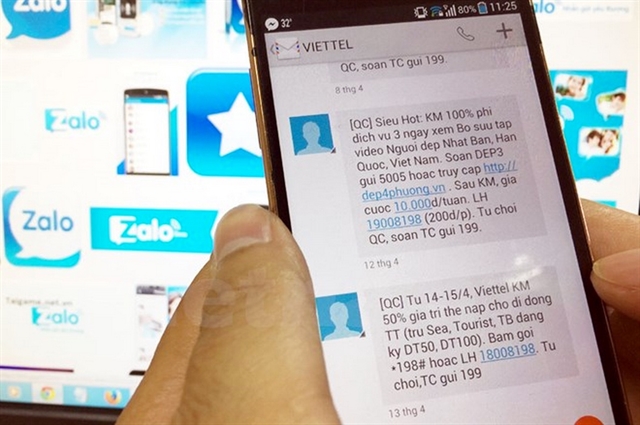New decree to combat spam in Viet Nam
Nguyen Hoa Thu’s attempts to get her baby to sleep at 9pm were going well, until she got a call from someone asking her to buy a house.
 |
| Strict fines will be applied for the spam texts that are so popular in Viet Nam since October 1. |
She let her mother take care of the one-year-old baby and went to another room to shout at the unknown caller.
“I don’t want to buy a house and never call me again!” she shouted.
Spam calls and texts are par for the course in Viet Nam, a country with approximately 130.4 million telephone subscriptions.
According to the Ministry of Information and Communication (MIC)’s department of telecommunications, it found 49 million spam calls from more than 26,700 phone numbers that disturbed about 18 million subscribers in Viet Nam within a month. Most of the calls and texts provide information on real estate, insurance, financial services and English courses.
After years of ineffective measures, the Government’s Decree 91/2020/ND-CP on the prevention of spam messages, spam emails, and spam calls will come into effect on October 1.
Under the decree, the Ministry of Information and Communications from the MIC’s Authority of Information Security will operate a system at the number 5656 (system 5656) where phone users can forward the spam text and call they receive and let relevant units fine the spammers.
For the first time, Viet Nam will have a national list of subscribers who do not want to receive any advertising text messages (National Do not call - DNC) so users on the list won't receive spam messages or calls. Local phone users can register on the list via the system 5656.
Advertisers, telecommunications and internet service providers who make calls or send advertising text messages to the phone numbers on the list will be fined up to VND100 million while telecommunication carriers who still allow the calls and texts to go through will be fined from VND140 million to VND170 million.
According to the decree, advertisers can only send advertising text messages if they send a copy of each text message to the system 5656 as well.
According to the decree, firms providing internet and telecommunication services have to comply with the MIC’s requirements on the prevention and handling of spam.
Though she's happy with the decree, Thu is still sceptical about how effective it will be.
“There have been so many unsuccessful actions to stop spam in Viet Nam as the messages and calls can bring profit to the providers. Can a decree prevent them all or will the providers have other ways to let them happen again?” she asked.
“I have been so disappointed with former regulations that failed to stop the spammers. Now we just wait and see," she said.
Source: VNS/ DA NANG Today